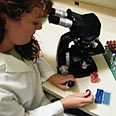Report on Israel’s bio-med sector acknowledges women’s dominance with 60-70 percent of the workforce
By Ynet
Women outnumber men in biology and related sciences in higher education in Israel, a report published by the Bloomberg news agency revealed on Tuesday.
This says the report, could give women an advantage as the government and private investors put increasing amounts of money into the life-sciences industry, one of the country’s fastest growing sectors, collecting the most venture capital money in the first half of this year.

‘A woman can make a mark’ Photo: Getty Image Bank Israel
The article quotes a number of Israeli women working in the field who share their thoughts on why women have the advantage.
Daniella Nistenpover 22, a bio-medical engineering major at the university in Haifa who plans to work in bio-mechanics or bio-materials research says that when she sits down in a lecture hall for one class in neurophysiology and another in biological processes, she sees a sea of women.
This is not the case when she takes courses in the theory of electrical circuits or differential equations at the predominantly male Technion-Israel Institute of Technology. She believes it is evidence that she has picked the right career.
“It makes you feel that in the life-sciences field, a woman can make a mark,” she adds.
“Women traditionally are not the main breadwinners in the family and can afford to pursue a PhD, whereas men have more pressure to go out and make a high salary,” says Anat Cohen- Dayag, president and CEO of Compugen Ltd., which was founded by members of an Israeli army intelligence unit that designed software to break codes.
The Tel Aviv-based company uses algorithms to trawl private and public databases to discover proteins that may have the ability to treat diseases.
According to Bloomberg, Cohen-Dayag is one of three female CEOs in the Tel Aviv Biomed index. The others are Kinneret Livnat Savitsky of BioLineRx Ltd., which develops clinical stage therapeutic pharmaceutical drugs, and Pnina Fishman of Can Fite Biopharma Ltd., which is focusing on treatments for autoimmune diseases and cancer.
Cohen-Dayag adds that the industry is a good fit for working mothers like herself, ‘‘Because of its academic characteristics, the culture in the industry has traditionally been more permissive, enabling more flexible hours, which has enabled women to juggle career and family.’’
Women give start-ups an edge
Women outnumber men in biology and related sciences in higher education in Israel. That could give women an advantage as the government and private investors put increasing amounts of money into the life-sciences industry, one of the country’s fastest growing sectors, collecting the most venture capital money in the first half of this year.

60-70% of the workforce
Biomedical companies attracted the most venture capital in the first half of this year, according to IVC-KPMG, which tracks the industry. The $240 million represented 26 percent of all the venture capital invested in startups in the period, more than in the previous year, a IVC-KPMG survey found.
Hiring and promoting women could also give startups an edge because women still have to work harder and be smarter than men to succeed, says Hagit Messer-Yaron, president of the Ra’anana- based Open University and the Ministry of Science’s chief scientist from 2000 to 2003.
“The women that make it to the top usually have to prove themselves and overcome hurdles that are above and beyond what men are required to do,” Messer-Yaron says. “When these women make it as managers, they are over-achievers and can help these companies succeed.”
And while most high-tech employees in Israel are male, women comprise 60 percent to 70 percent of the biotechnology workforce, according to Nisha Group, a recruiting firm based near Tel Aviv.
Still, men dominate upper management. Women hold about 13 percent of chief executive officer positions in companies in the Tel Aviv Biomed index and less than 5 percent in the Tel Aviv Technology index, according to data analyzed by Bloomberg.
That’s destined to change in biotech, says Ora Dar, head of the life sciences sector at the Office of the Chief Scientist in the Ministry of Industry, Trade and Labor.
“As this field matures, you are going to see women increasingly taking executive positions,” says Dar, whose team of about 100 evaluators, who decide what projects and incubators to finance with taxpayer money, is more than 70 percent female. “It’s a matter of experience.”
According to Lizi Shuv, a partner and Director of Nisha Biotech. Some 58% of biology degree holders in Israel who received their degree in 2010 are women. This, compared with 44% in the US, according to government data.
View original Ynet publication at: http://www.ynetnews.com/articles/0,7340,L-4271882,00.html







 Israeli New Shekel Exchange Rate
Israeli New Shekel Exchange Rate